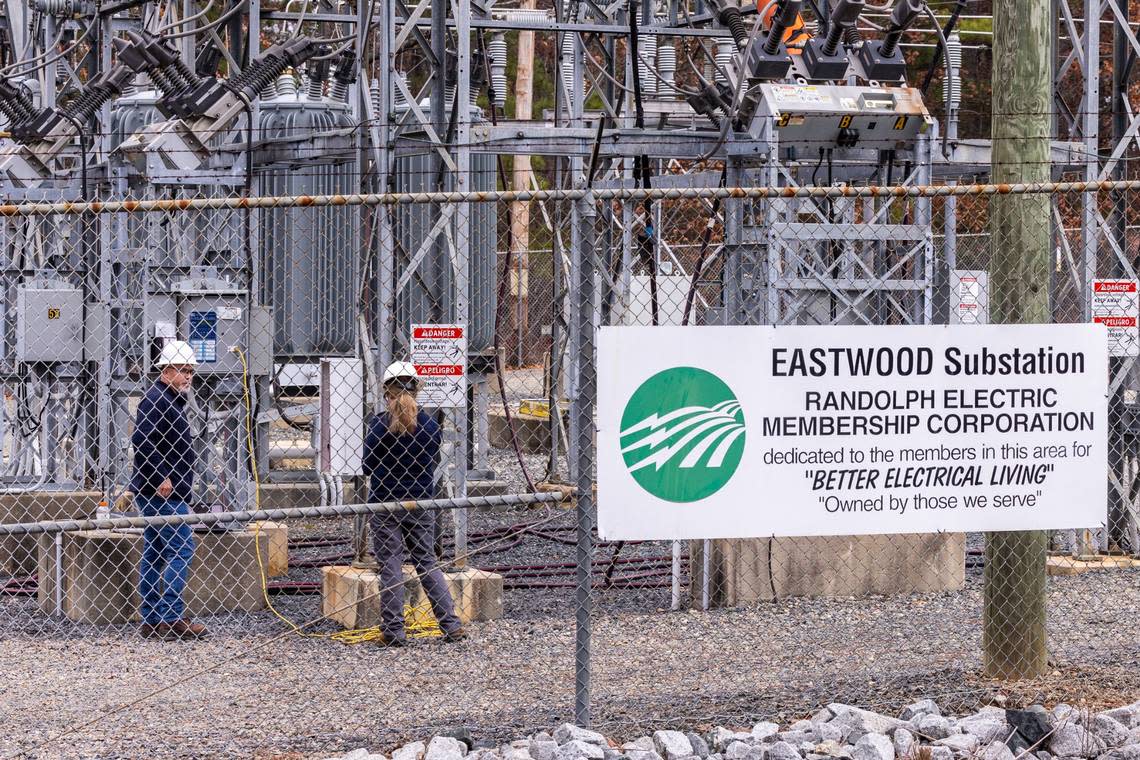NC lawmakers propose tougher criminal penalties for attacks on power substations

A bill filed Wednesday in the North Carolina Senate would enact stricter criminal penalties for damage done to electrical substations and other vital infrastructure, in light of the December attack on substations in Moore County that left tens of thousands without power for days.
Senate Bill 58, introduced by GOP Sens. Tom McInnis, Danny Britt and Paul Newton, would make it a Class C felony to damage or try to damage substations or other energy facilities. The offense would carry a sentence of up to 123 months, or just over 10 years in prison, along with a $250,000 fine.
In addition to stiffer penalties for damaging substations, the bill would also make it a Class I felony to, without authorization, enter or remain on the premises of energy facilities, facilities that are a part of a public water system, or facilities involved in specific agricultural activities.
“This was a willful, intentional and malicious act, not a random act,” McInnis, who represents Moore County in the Senate, said of the December attack during a press conference. “It was intended to do harm to a large number of people — 40,000 households and businesses, basically the whole county.”
Lawmakers also included tougher penalties for damage done to telephone wires and poles, and other equipment used by telephone and broadband companies, making that a Class C felony as well.
After the attack in Moore County, lawmakers said they wanted to enact more severe penalties and fines to deter people from trying to attack substations or other important infrastructure in the future. The bill would also allow people who suffer personal or property damage as the result of a substation being disabled to sue the individuals responsible for three times the cost of damages, costs and attorneys’ fees.
“Our message is very simple: If you are contemplating destroying electrical infrastructure or other critical infrastructure in North Carolina, don’t do it,” Newton said.
The power outages in Moore County
Nearly 45,000 Duke Energy customers were impacted by outages after power went out on the evening of Dec. 8, when authorities said two substations were damaged by gunfire from suspects who officials have yet to identify. Power was gradually restored over days.
The outages for thousands of homes and businesses forced people to sit in the dark without heat, charge their phones in their cars and preserve food in refrigerators powered by generators. The county declared a state of emergency during the outages and imposed a curfew, and public schools remained closed until the end of the week.
In the aftermath of the outages, officials announced a $75,000 reward funded jointly by the state, Duke Energy, and Moore County, for information leading to the arrest and conviction of whoever was responsible for destroying the substations.
Penalties for damaging energy facilities are much harsher under existing federal law, which provides for a 20-year maximum sentence if the damage exceeds $100,000, or if someone causes or tries to cause “a significant interruption or impairment of a function” of the facility.
McInnis said the bill’s language aligns with the federal definition, and also protects “any emerging technologies used to provide energy.”
Security at substations
Gov. Roy Cooper, who was being briefed regularly on the attacks and subsequent investigation being conducted by local and state officials and the FBI, said that it was “too easy” for the substations to be damaged and go offline, and called for a long-term assessment of substations in the state.
Another bill introduced last week by GOP Rep. Ben Moss, who represents Moore County in the House, would require public utilities in the state to “provide security systems at substations to protect against vandalism and other security threats,” and continuously operate those systems 24 hours a day.
That bill, named the Energy Security Act of 2023, has gained bipartisan support, with 21 other members of the House signing on as sponsors.
Asked if he supported Moss’s bill, McInnis said he hadn’t read it yet. McInnis said the bill he and other senators were introducing was “specific, direct, and ready to be put into place.”
On Wednesday evening, Moss announced he was amending his bill to also implement more severe criminal penalties for damaging substations, including a felony charge that would carry up to 10 years in prison, and a $500,000 fine.
The amended bill would also include a civil liability provision requiring perpetrators to repay the costs of property damage.
“From the start, my objective was to have everyone come together to find policy solutions that are feasible and cost-effective,” Moss said in a statement. “The first draft of this bill was a necessary step to get the conversations started and after receiving feedback from my constituents, I have decided that we need stronger penalties to work in tandem with the security regulations.”
“It is imperative that we protect our power grids and deter future attacks on this critical infrastructure,” he added.
For more North Carolina government and politics news, subscribe to the Under the Dome politics newsletter from The News & Observer and the NC Insider and follow our weekly Under the Dome podcast at campsite.bio/underthedome or wherever you get your podcasts.
